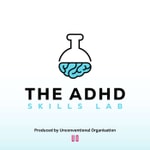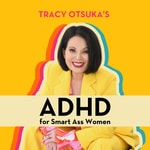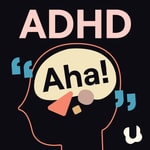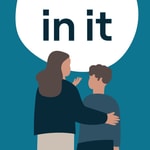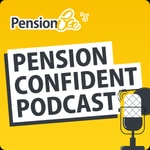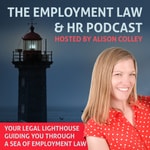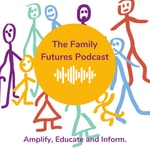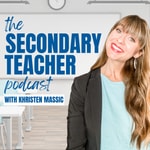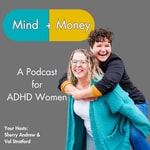All Aboard ADHD – Détails, épisodes et analyse
Détails du podcast
Informations techniques et générales issues du flux RSS du podcast.
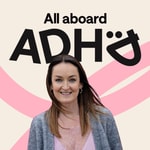
All Aboard ADHD
Claire Quigley Ward
Fréquence : 1 épisode/13j. Total Éps: 40

Classements récents
Dernières positions dans les classements Apple Podcasts et Spotify.
Apple Podcasts
🇬🇧 Grande Bretagne - parenting
31/07/2025#84🇬🇧 Grande Bretagne - parenting
30/07/2025#82🇬🇧 Grande Bretagne - parenting
29/07/2025#50🇬🇧 Grande Bretagne - parenting
28/07/2025#50🇬🇧 Grande Bretagne - parenting
27/07/2025#37🇬🇧 Grande Bretagne - kidsAndFamily
27/07/2025#93🇬🇧 Grande Bretagne - parenting
26/07/2025#66🇬🇧 Grande Bretagne - parenting
25/07/2025#93🇬🇧 Grande Bretagne - parenting
24/07/2025#84🇬🇧 Grande Bretagne - parenting
19/07/2025#90
Spotify
Aucun classement récent disponible
Liens partagés entre épisodes et podcasts
Liens présents dans les descriptions d'épisodes et autres podcasts les utilisant également.
See all- https://www.adhdadult.uk/
160 partages
- https://goblin.tools/
40 partages
- https://adhduk.co.uk/
28 partages
- https://www.instagram.com/mrgteacher
3 partages
- https://www.instagram.com/HemptonHouse
2 partages
Qualité et score du flux RSS
Évaluation technique de la qualité et de la structure du flux RSS.
See allScore global : 63%
Historique des publications
Répartition mensuelle des publications d'épisodes au fil des années.
Treating and Parenting ADHD
Saison 1 · Épisode 17
vendredi 6 septembre 2024 • Durée 31:35
In this episode of the All Aboard ADHD Podcast, Claire is joined by expert guest Professor, Stephen Scott to discuss ADHD treatments and why parenting matters. Stephen is a Professor of Child Health and Behaviour at the Institute of Psychiatry, Psychology and Neuroscience at King's College London, and the Director of the National Academy for Parenting Research. He is also a Consultant Child and Adolescent Psychiatrist at the Maudsley Hospital, where he specializes in ADHD and challenging behaviour. Stephen's research specialises in the most effective ways to help children be happier and better adjusted, and as the author of the best selling textbook Child and Adolescent Psychiatry, Stephen literally wrote the book.
Claire and Stephen discuss what is really behind the recent increase in ADHD diagnoses and why proper assessment and medication are so important for children with ADHD. Stephen shares some fascinating insight into the power of stimulant medication and how they can significantly improve symptoms, whilst also dispelling myths about certain medications being addictive.
Stephen and Claire also highlight the need for a holistic approach to treatment, such as taking a positive parenting approach. Scott shares some fantastic tips for parents of ADHD children, including clear communication of expectations and immediate positive reinforcement when we spot our children doing something well. He also introduces his Parenting Matters online course, which helps more parents support their children with behaviour and emotional issues
Professor Stephen shares a message of hope for parents of ADHD children, reassuring us that with proper support, ADHD children can thrive and lead happy, fulfilling lives.
To find out more about Professor Stephen and his work, head to
https://parentingmatters.co.uk/
https://www.kcl.ac.uk/people/stephen-scott
https://slam.nhs.uk/experts/?consultant=234&letter=S
To buy a copy of his book, head here:
Child and Adolescent Psychiatry, 3rd Edition
https://open.spotify.com/episode/4Ahg0IWnyDPpKwIrrogOis?si=CGtdsp-vRZCJuJz-FOf-hg&t=6506
Emily Snape - My Parenting Story
Saison 1 · Épisode 15
vendredi 23 août 2024 • Durée 25:58
How do you talk about ADHD with your child?
In this episode of the All Aboard ADHD podcast, Claire is joined by Emily Snape - a mum to 3 children, one of whom has ADHD. Emily is a children's author and illustrator, working with young people celebrating and supporting their amazing, creative neurodivergent minds.
Emily shares her personal experiences as a parent of a child with ADHD, inspiring her wonderful book "My Amazing ADHD Brain." Emily’s book provides an age-appropriate resource, giving parents a helpful starting point to have conversations with their children about their ADHD brain. Claire shares an incredible example of doing just this with her own daughter, resulting in a beautiful moment of connection between them.
Emily first noticed signs of her son struggling in Year 6, including challenges with friendships and taking SATs, culminating in him refusing to go to school. Claire and Emily go on to discuss their experiences of getting a diagnosis for their children and how, despite concerns about ‘labeling’, ultimately it was beneficial not just to help their children understand their brain, but as parents, to be able to educate others around them about ADHD. Emily highlights how her own experience with diagnosis inspired her to write her book, which focuses on educating children about their brains, provides tips for navigating challenges, and encourages children to embrace their strengths.
Emily shares some of the helpful accommodations her son could access in secondary school once he had a diagnosis, such as having a pass to go out of the classroom if he was feeling overwhelmed or fidgety. She also shares some of the challenges of advocating for her son but ultimately how she believes we should focus on ADHD strengths rather than challenges.
Emily and Claire also discuss the impact of emotional dysregulation on ADHD children, which is often missed by schools. Emily shares some fantastic advice for teachers and parents alike to help ADHD children when they are dysregulated, supporting them to learn how to regulate their own emotions as they grow up, and supporting them to ‘own’ their ADHD.
To find out more about Emily and her work, you can find out her latest publishing news on Instagram at @emily_snape_illustrator or to buy a copy of book head here; https://www.amazon.co.uk/My-Amazing-ADHD-Brain-Thriving/dp/183799126X
Hannah Hampton - My Parenting Story
Saison 1 · Épisode 7
vendredi 19 avril 2024 • Durée 56:45
In this episode, Claire welcomes Hannah Hampton - mum to 3 daughters, 2 of whom have been diagnosed with ADHD. Hannah introduces us to two very different presentations of ADHD in her eldest and middle girls and some of their unique strengths, character traits and preferences.
Hannah shares some of the early signs of ADHD she noticed in her eldest daughter, even as far back as baby and toddler classes, including her early love of ‘art’ (such as car seat graffiti!). As a highly active toddler and small child she had lots of energy she needed to externalise and as Hannah explains, this could sometimes prove challenging in a busy family environment. Once she entered the school system it became clear she was experiencing challenges around attention and focus. Hannah talks about the lightbulb moment that led her to realise her daughter's behaviour was markedly different from her peers and what action she took initially to confirm her suspicions and seek diagnoses - which came in the form of both Dyslexia and ADHD.
In stark contrast, Hannah’s middle daughter didn’t show any of the classic ADHD signs of impulsiveness and hyperactivity, nor was she struggling academically. Her main challenges were around emotional regulation and frequent outbursts. Whilst Hannah knew something was up, she was so different from her eldest, she just wasn’t sure it was ADHD.
Hannah shares the book she read that completely changed her view and helped her understand just how different ADHD profiles can be. She also talks through the journey of diagnosis for both of her daughters, what she and her family put in place, and what really made a difference to her daughters' daily experience, including school accommodations, medication, counseling and experts such as educational psychologists.
With some incredible advice on what action to take if you suspect your child has ADHD, how to deal with the emotions that arise as a parent of a child who has been diagnosed and a fantastic insight into the range of ways you can support your child, this episode is a must-listen, whoever you are on your ADHD journey with your child.
To find out more about Hannah and her work, head to:
ADHD and Attachment
Saison 1 · Épisode 6
vendredi 5 avril 2024 • Durée 35:32
How do attachment styles in babies and children affect their brains if they have ADHD? Even before diagnosis, early childhood experiences will shape their response to real or perceived threats. With the right understanding of what drives their children’s emotional responses, parents can give them the support they need to better tune into and regulate their emotions.
In this episode, Claire explores the link between ADHD and Attachment with expert guest Dr Deba Choudhury-Peters - Chartered Consultant Clinical Psychologist with over 20 years of clinical experience and the founder of DCP Therapy: an independent psychological therapy practice in London, offering a tailor-made holistic approach, with particular focus on the body-mind connection. Dr Deba works with a wide range of psychological problems and specialises in therapy for trauma and attachment styles in relationships.
Dr Deba explains the basics behind attachment theory - covering the main types and how they manifest in ADHD children. She also talks about what this might mean as your child grows and interacts with other adults and children around them, for example at school. We learn some powerful ways that taking a holistic approach, engaging both the mind and the body, can help empower both children and parents to celebrate their differences.
If you’d like to learn more about Attachment and Dr Deba’s work, then please check out Deba’s services at DCP Therapy here: https://dcptherapy.com
ADHD in Schools
Saison 1 · Épisode 5
vendredi 22 mars 2024 • Durée 42:14
How can we better support ADHD kids in schools? How do so many ADHD teens and young adults end up in prison? Why does one diagnosis seem to be the point at which things stop, when the co-occurring nature of neurodivergent differences is so high? All these questions and lots more are answered in this episode, Claire is joined by Sarah Templeton - ADHD author, accredited counsellor, coach and founder of Headstuff ADHD Therapy - the biggest ADHD counselling and coaching company in the UK.
Sarah herself was not diagnosed with ADHD until her early 50’s, which came as a huge shock. Since that diagnosis in 2015, she has dedicated her life to helping ADHD children and adults. She is especially passionate about raising awareness and understanding of ADHD in schools and in the criminal justice system.
Sarah talks about how ADHD might affect a child's experience at school and their ability to learn in a classroom, with some fascinating insights as to how teachers might play to their ADHD pupils' strengths and engage them in their own learning process. She also shares some surprising stats around ADHD and the range of co-occurring conditions, particularly Dyslexia, and the additional challenges this can present for children, teachers and parents. We learn just how easy the path from undiagnosed or unsupported ADHD in children can lead to a criminal record but crucially, through awareness and the right practical strategies, how easy it can be to avoid.
If you are a parent of an ADHD child looking for an inspiring listen with practical advice to help you advocate for your child at school or college and help them play to their strengths, this episode is for you.
To find out more about Sarah and her work, head to: https://www.sarahtempleton.org.uk/
Sarah has also written multiple books:
Carrie Grant - My Parenting Story
Saison 1 · Épisode 4
vendredi 8 mars 2024 • Durée 52:12
What does ‘a very modern family’ look like from the inside? In this episode, I am joined by BAFTA award-winning Carrie Grant for a raw, honest and thoroughly inspiring introduction to her wonderfully diverse “multi-hyphenate” ND family. Carrie shares the highs and lows of parenting four children across their experiences of ADHD, PDA (pathological demand avoidance), DMDD (disruptive mood dysregulation disorder), Autism and Dyscalculia, but also the additional challenges they face, coming from mixed-race heritage and discovering diversity in terms of sexuality and gender too.
Carrie shares examples of early behaviours that pointed to the potential of ADHD in her children. With over 60% of black and mixed race children sent down a SEMH pathway (social, emotional and mental health) than a SEND pathway (special educational needs and disabilities) Carrie also points towards the dangers of cultural stereotypes and also how early signs may not be as obvious in AFAB children (assigned female at birth) or indeed how behaviour at school vs at home can wildly differ. With diagnoses therefore arriving at different ages and stages for her children, Carrie shares the reality of the grief that can come with late diagnosis and what we must do better, particularly in schools, to support our neurodivergent children.
Carrie goes on to share some honest reflections about the impact of late diagnosis on how she views her own parenting and how developing a deep understanding of her children’s needs has helped her to advocate for them - and ultimately for them to learn to advocate for themselves. Going on to share how things looked for herself and her children post-diagnosis, Carrie introduces us to the world of getting “reasonable adjustments” in place, faced with various reactions and levels of commitment from the school system. She also shares a great tip for the one person to look out for on your journey to help your child get the support they need - and it’s not the person you might expect!
She also shares a hopeful message about the strengths and incredible creative abilities of her children. This episode is a must-listen for parents not just of children with ADHD, but also those of “multi-hyphenate” children who don’t fit into society’s boxes.
Carrie and her husband David run a support group for over 200 families and have a book out on Little Brown called: A Very Modern Family.
Identifying & Diagnosing ADHD
Saison 1 · Épisode 3
vendredi 23 février 2024 • Durée 34:15
What is the ADHD Children’s Evaluation and what can it give parents who suspect their child has ADHD? In this episode, Claire is joined by Professor Susan Young to discuss the ACE assessment. Susan shares the real reason that it was developed and how it has quickly been adopted as a tool not just across the UK, but globally, and has also been expanded to include young people and adults.
Professor Susan explains what makes the ACE tool so different from other ‘tick box’ assessment tools and how its design ensures the identification of symptoms that may already be ‘masked’ by changes in behaviour or existing accommodations to minimise impact at school at home. Professor Susan goes on to share other key differences in the ACE tool, including providing space for signs or “pings” of known or unknown co-existing conditions such as autism, allowing for the reality that ”most children will have ADHD plus something else”. She also stresses the Importance of the assessment being carried out by a qualified Healthcare Clinician. so they can truly answer the question: Is this ADHD or something else?
Do you have a boisterous boy or a dreamy giggly girl? Professor Susan shares more about the difference in ADHD presentation between boys and girls and the inherent bias in the ADHD criteria that the ACE tool seeks to counter. Whilst the disruption caused by a typical ADHD boy's behaviour means their ADHD is more likely to be picked up earlier on, with girls their symptoms can be less obvious, for example daydreaming and struggling to maintain friendships. Such is this difference that a recent Study in Sweden uncovered a huge difference in time to diagnosis - although Professor Susan believes the real number could be even larger due to girls' ability to camouflage - even in an assessment interview.
Claire and Professor Susan go on to discuss the importance of early intervention and the wide range of different options parents have to make accommodations and support their child - not just medication. They also discuss the importance of taking it one step at a time and exploring what you can do to support your child whilst you’re waiting for an assessment.
To find out more about Professor Susan’s work, head to her website where you will also find psychoeducational resources and strategies to support children, young people and adults with ADHD, and their parents and carers: http://www.psychology-services.uk.com/service-users
Her books are:
Cognitive-behavioural Therapy for ADHD in Adolescents and Adults: A Psychological Guide to Practice 2nd Edition. Chichester: John Wiley & Sons Ltd (Susan Young and Jessica
Bramham): https://www.amazon.com/Cognitive-Behavioural-Therapy-ADHD-Adolescents- Adults/dp/1119960738/ref=sr_1_1?crid=26ZIWZJ623DSK&keywords=young+bramham+adhd+cognitive+therapy&qid=1671205802&sprefi x=young+bramham+adhd+cognitive+therapy%2Caps%2C181&sr=8-1
Helping Children with ADHD: A CBT Guide for Practitioners, Parents and Teachers’ (written by Susan Young and Jade Smith): https://www.amazon.co.uk/Helping-Children-ADHD-Practitioners- Teachers/dp/1118903188/ref=sr_1_1?crid=12PCVLA5KF9X&keywords=young+smith+CBT+adhd&qid=1671205933&sprefix=young+smith+ cbt+adhd%2Caps%2C132&sr=8-1
For support with your ADHD child, discover her ‘‘Spot it and Sort it’ videos here: https://professor-susan-young-psychology-services.teachable.com
What is ADHD?
Saison 1 · Épisode 2
vendredi 23 février 2024 • Durée 40:35
In this episode, Claire and Professor Edmund dive into the all-important question: what is ADHD? Professor Edmund - Professor of Developmental Psychology, Psychiatry and Neuroscience at Kings College London - sheds light on just how tricky that question can be to answer, due to the rapidly evolving research and narrative around the condition. He breaks down the medical definition, but clarifies also the emerging ‘neurodiversity' view of ADHD and crucially, how these two differ in their perspective.
They discuss the potential ADHD impact on daily life, for children and their parents, encouraging us to look at the positives as well as the negatives! Professor Edmund shares some key insight into the impact of environmental factors on how ADHD can manifest - for example the difference between school and home. They also discuss some of the key differences between how ADHD looks in boys and girls, delving into just why ADHD is so often overlooked in girls in particular and how this is now changing, with the advent of more research into ADHD in females.
Professor Edmund introduces us to the idea of a ‘wonky self-concept’ that can develop in ADHD children as a result of negative feedback from friends and teachers, but also sheds light on many ADHD strengths that have gone unnoticed historically, including the mischievous magpie mind!
Professor Edmund busts some of the current myths around ADHD and the danger of taking a polarised view. Whilst some might say ADHD kids are ‘just naughty’, others might say ‘they can’t be naughty, they just have ADHD’. In Professor Edmund’s view, the answer lies elsewhere and he explains more about the danger of pointing to any one thing as the ‘cause’ of ADHD.
This episode is a must for any parent starting out on their ADHD journey to get a clear view of what ADHD is (and isn’t!). If you’d like to find out more about Professor Edmund and his work, head here:
- Professor of Developmental Psychology, Psychiatry and Neuroscience, Kings College London
- Fellow of the Academy of Medical Sciences
- Fellow of The British Academy
- Member of the Academia Europea
- Editor in Chief of The Journal of Child Psychology and Psychiatry
- The Association for Child and Adolescent Mental Health
Claire Quigley Ward - My Parenting Story
Saison 1 · Épisode 1
jeudi 22 février 2024 • Durée 46:40
Early Childhood Adversity & ADHD
Saison 1 · Épisode 15
vendredi 9 août 2024 • Durée 26:48
Why is there such a large disconnect between the research and practice with adopted children?
In this episode of the All Aboard ADHD Podcast, Claire is joined by expert guest, Dr Mark Kennedy to discuss the link between early adversity and ADHD in adopted children. Dr Mark is a Senior Lecturer program lead and a researcher on the English and Romanian adoptees study at King's College London. His PhD focused on modern applications of attachment theory and his postdoctoral work has focused on the developmental outcomes of extreme early adversity, including ADHD, neurodevelopmental disorders, attachment, and mental health.
Mark and Claire begin by looking at connections between early adversity and ADHD in adopted children. Mark highlights how misdiagnosis of ADHD can often occur due to assumptions about attachment issues that stem from studies carried out in the 1980s and 1990s. He goes on to shed light on some of the more recent research and the incorrect assumptions that have led to an under-diagnosis of ADHD and over-diagnosis of attachment issues. For example, children who have a history of issues such as institutional deprivation have a much higher likelihood of having ADHD than people without those experiences.
Mark also shares some fascinating insight from research studies on the adult outcomes of children with ADHD symptoms in childhood, stressing the importance of early intervention to ensure better outcomes for adopted children. Shockingly, the rates of unemployment were 88% in one study, alongside outcomes such as higher rates of mental health problems and lower rates of educational attainment. However, with the right information, alongside evidence-based treatment or support options, outcomes can be significantly better.
One of Mark’s driving forces is raising awareness of ADHD and supporting adoptive parents with good-quality information. Therefore Mark created the King's College London “Understanding ADHD, Current Research and Practice” MOOC (massive online open course) accredited by the CPD. You can undertake this course for free to learn more about ADHD, including symptoms, the latest research, and treatment. So far, over 114,000 people have enrolled for the course designed to help change attitudes around ADHD.
To learn more about the course head to: https://www.futurelearn.com/courses/understanding-adhd
